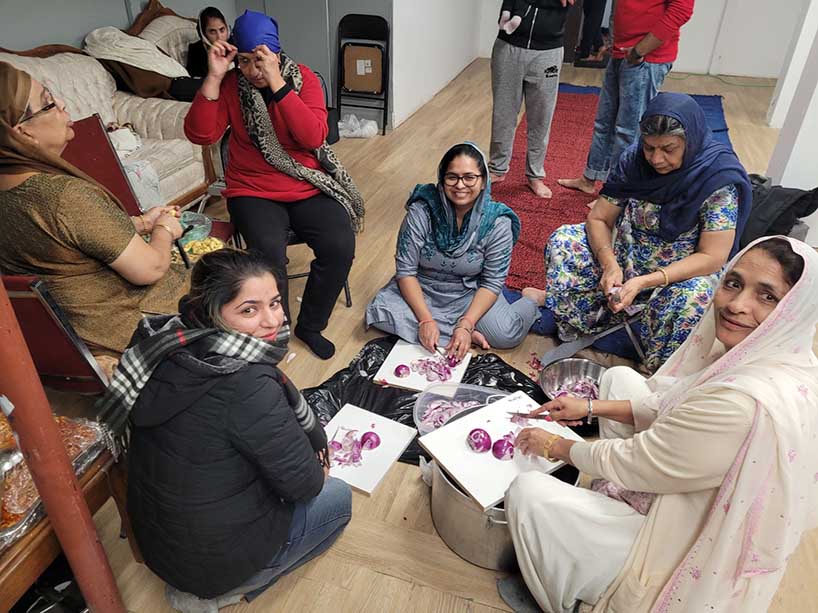The impact of diaspora support in a time of crisis

The study shows how newcomers and international students received food, shelter, social connection and mental health support from diaspora organizations during the pandemic.
Moving across continents to start a new life can be daunting under any circumstances. When the COVID-19 pandemic began, many newcomers and international students in Canada had to navigate greater challenges as they faced social isolation, financial struggles and an uncertain future.
Recently published research (external link) by Melissa Kelly and Ashika Niraula, who are on the team of the Canada Excellence Research Chair (CERC) in Migration and Integration, shows that South Asian diaspora communities mobilized swiftly to provide culturally sensitive support and services to recent immigrants and international students.
With more than 2.6 million people (external link) of South Asian heritage living in Canada, Kelly and Niraula were drawn to exploring how the community’s diaspora organizations serve as social capital to new immigrants during times of crises.
“There has been growing evidence of diaspora communities making substantial contributions to support humanitarian action amid crisis situations in their home countries, regions of origin or host countries,” said Niraula, senior research fellow and project lead at CERC in Migration and Integration.
“They have experience navigating the complex context of crisis and emergency situations, such as war, earthquakes, famine and other calamities. Their prompt and effective response to support South Asian immigrants and international students, the largest visible minority group in Canada, during the pandemic crisis was an excellent example of diaspora engagement and resilience.”
Providing culturally appropriate support
The peak of the pandemic was an exceptionally difficult time for many Canadians. New immigrants were severely affected, Niraula shared, because many of them were working in hard-hit sectors like hospitality and were the first to lose their jobs.
“Many temporary visa holders and international students were not able to fulfill the eligibility requirements to receive government-funded financial support, such as Canada Emergency Response Benefit. And further, the uncertain nature of the pandemic meant that nobody in service roles (officials at Immigration, Refugees and Citizenship Canada, settlement service providers or post-secondary institutions) was prepared or well equipped to deal with the challenges brought by the pandemic. The immigrants and international students were often confused and lacked access to resources and information,” Niraula said.
The report, titled Mobilizing to support those most in need: the importance of diasporic social capital during the COVID-19 pandemic, describes how social and religious institutions such as gurdwaras and temples deployed culturally and religiously appropriate mental health support for community members.
One such gurdwara is the Sikh Sangat of Timmins (external link) , established in December 2021 by Kanwaljit Singh and her husband, who helped newcomers overcome loneliness and other psychological impacts of the pandemic.

Women preparing food at the Sikh Sangat of Timmins. The concept of ‘Seva’ is central to Sikhism and refers to selfless service for others.
“A lot of international students coming to Canada didn’t have a place to stay, they didn’t know how to navigate the winter season and were experiencing cultural shock,” Singh said.
“We offered counseling to students suffering from depression. Sometimes, they just needed someone to talk to and we gave them that. People who couldn’t find jobs and were experiencing homelessness stayed at the Gurdwara. [For] those who had a place to stay but couldn’t afford food, we arranged for them to pick up food from the Gurdwara everyday, keeping COVID-19 restrictions in mind.”
Although mental health support and counselling is available to international students through post-secondary institutions and settlement services, Niraula explained that many South Asian immigrants and international students are reluctant to access such support because the subject is considered taboo in many cultures. But when offered from within the diaspora, they were more likely to seek help and access services.
“Many community leaders and volunteers went above and beyond to support new immigrants and international students, some of whom received daily meal deliveries to ensure that they had access to food that met their cultural and religious dietary needs,” said Kelly, senior research associate at CERC in Migration and Integration.
“Many others were provided with temporary accommodation. This allowed recent immigrants to focus on meeting mandatory testing and quarantine requirements rather than worrying about their day-to-day needs upon arrival in Canada. It also meant that they did not feel disoriented or alone, despite arriving in a completely new country amid a global pandemic.”
A (PDF file) study on immigrant retention trends (external link) published by the Institute for Canadian Citizenship and the Conference Board of Canada stated that many immigrants are choosing to leave Canada in recent years. It showed that the number of immigrants who left Canada in 2017 and 2019 rose by 31 per cent above the historical average.
Given this recent trend and the post-pandemic challenges that many newcomers face of trying to build a sense of community and belonging, tackle feelings of exclusion and find job opportunities, the contributions of diaspora communities and the social capital they provide remain invaluable.
Related stories
Massive immigration research team set to make waves in Canadian integration policy





